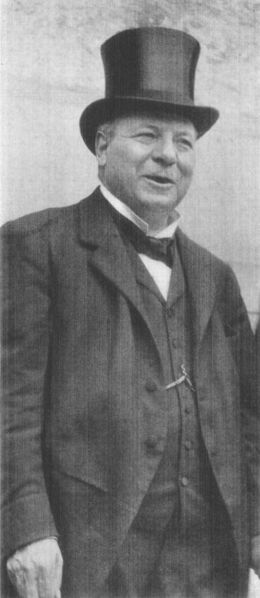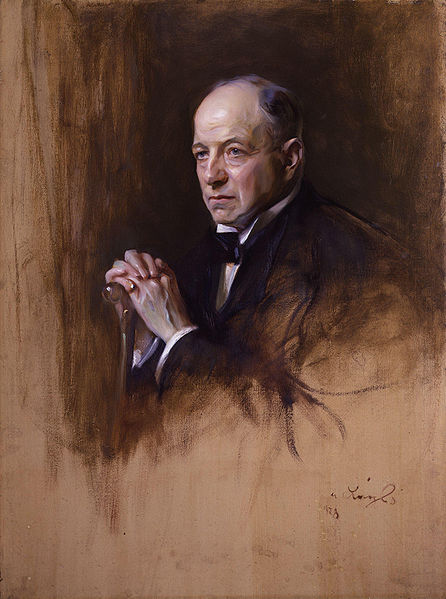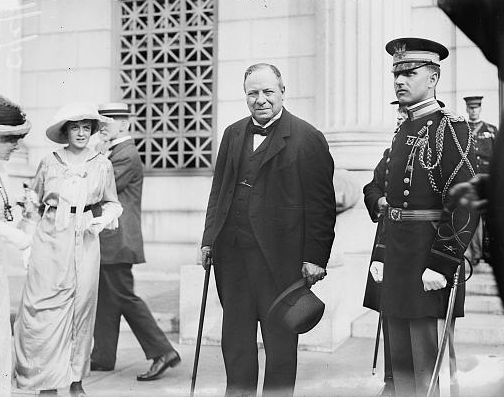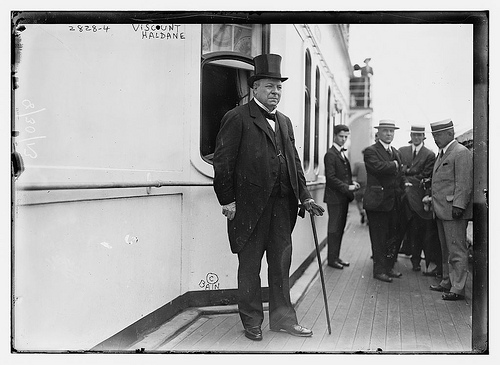<Back to Index>
- Geophysicist Felix Andries Vening Meinesz, 1887
- Sculptor James Edward Kelly, 1855
- Secretary of State for War Richard Burdon Haldane, 1856
PAGE SPONSOR


Richard Burdon Haldane, 1st Viscount Haldane KT, OM, PC, KC, FRS, FBA, FSA (30 July 1856 – 19 August 1928), was an influential British Liberal and later Labour politician, lawyer and philosopher. He was Secretary of State for War between 1905 and 1912 during which time the "Haldane Reforms" were implemented. Raised to the peerage as Viscount Haldane in 1911, he was Lord Chancellor between 1912 and 1915, when he was forced to resign. He later joined the Labour Party and once again served as Lord Chancellor in 1924 the first ever Labour administration. Apart from his legal and political careers, Haldane was also an influential writer on philosophy, in recognition of which he was elected a Fellow of the British Academy in 1914.
Haldane was born in Edinburgh, Scotland, the son of Robert Haldane and his wife Mary Elizabeth, daughter of Richard Burdon - Sanderson. He was the grandson of the Scottish evangelist James Alexander Haldane, the brother of respiratory physiologist John Scott Haldane, Sir William Haldane and author Elizabeth Haldane and the uncle of J.B.S. Haldane. He received his first education at the Edinburgh Academy and at the Göttingen University and University of Edinburgh where he received first - class honors in Philosophy and as Gray scholar and Ferguson scholar in philosophy of the four Scottish Universities. After studying law in London, he was called to the Bar, Lincoln's Inn, in 1879, and became a successful lawyer. In 1890 he was made a Queen's Counsel.
In 1885 Haldane was elected Liberal Member of Parliament for Haddingtonshire, a seat he held until 1911. In 1902 he was admitted to the Privy Council.
After the Conservative government of Arthur Balfour fell in December 1905 there was some speculation that Herbert Henry Asquith and his allies Haldane and Sir Edward Grey would refuse to serve unless Campbell - Bannerman accepted a peerage, which would have left Asquith as the real leader in the House of Commons. However, the plot (called "The Relugas Compact" after the Scottish lodge where the men met) collapsed when Asquith agreed to serve as Chancellor of the Exchequer under Campbell - Bannerman. Haldane was appointed Secretary of State for War (Grey became Foreign Secretary). The party won a landslide victory in the 1906 general election. Haldane, a prominent Liberal Imperialist and close associate of Asquith, was a strong advocate of British commitments on the continent, and implemented the "Haldane Reforms", a wide ranging set of reforms aimed at preparing the army for participation in a possible European war. The main element of this was the establishment of the British Expeditionary Force, along with the creation of the Imperial General Staff, the Territorial Force, the Officer Training Corps, and the Special Reserve. He was also instrumental in the creation the Advisory Committee for Aeronautics in 1909, which provided the fledgling aircraft industry in the United Kingdom with a sound body of science on which to base the development of aircraft for the next seventy years (it was disbanded in 1979). This institution was soon copied by many other major developed countries.
In 1911 he was raised to the peerage as Viscount Haldane, of Cloan in the County of Perth.
On Lord Loreburn's retirement in 1912, Haldane succeeded him as Lord Chancellor. That year saw the unsuccessful attempt of the Haldane Mission. In 1913 he was made a Knight of the Thistle. However, he was forced to resign in 1915, after being falsely accused of pro-German sympathies. The accusations were widely believed, even being echoed in a popular music hall song ("All dressed up and nowhere to go") in the revue "Mr Manhattan". As the war progressed, Haldane moved increasingly close to the Labour Party but he was held back by his ties to the Liberal Party and to Asquith. It was not until the general election of 1923 that Haldane formally sided with Labour, and made several speeches on behalf of Labour candidates. When the Labour government was formed by Ramsay MacDonald in early 1924, Haldane was recruited to serve once again as Lord Chancellor. He was also joint Leader of the Labour Peers with Lord Parmoor. Haldane was a vital member of the Cabinet as he was one of only three members who had sat in a cabinet before; the other two had sat only briefly and for junior posts.
In 1895 Haldane helped found the London School of Economics. He was also a member of the Coefficients dining club of social reformers set up in 1902 by the Fabian campaigners Sidney and Beatrice Webb. In 1904 he was President of the Edinburgh Sir Walter Scott Club and gave the Toast to Sir Walter at the clubs annual dinner. He also served as second Chancellor of the University of Bristol, and was elected Chancellor of the University of St Andrews shortly before his death.
Haldane co-translated the first English edition of Schopenhauer's The World as Will and Representation, published between 1883 and 1886. He wrote several philosophical works, the best known of which is The Reign of Relativity (1921), which dealt with the philosophical implications of the theory of relativity. From 1907 to 1908 he was president of the Aristotelian Society.
Haldane
remained a lifelong bachelor after his fiancée, Miss Valentine
Ferguson, broke off their engagement. He died suddenly of heart disease
at his home in Auchterarder, Scotland, on 19 August 1928, aged 72. The viscountcy became extinct on his death. Lord Birkenhead, the Conservative politician, praised Haldane in November 1923 as an exception to the idealism in Britain before the Great War: In
the welter of sentimentality, amid which Great Britain might easily
have mouldered into ruin, my valued colleague, Lord Haldane, presented
a figure alike interesting, individual, and arresting. In speech fluent
and even infinite he yielded to no living idealist in the easy coinage
of sentimental phraseology. Here, indeed, he was a match for those who
distributed the chloroform of Berlin. Do we not remember, for instance,
that Germany was his spiritual home? But he none the less prepared
himself, and the Empire, to talk when the time came with his spiritual
friends in language not in the least spiritual. He devised the
Territorial Army, which was capable of becoming the easy nucleus of
national conscription, and which unquestionably ought to have been used
for that purpose at the outbreak of war. He created the Imperial
General Staff. He founded the Officers' Training Corps. The military historian Correlli Barnett claimed
Haldane had "all-round personal talents far exceeding those of his
predecessors" as Secretary of State for War and was "a man of
first - class intellect and wide education".

